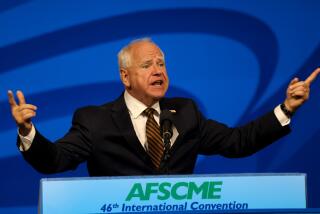Why Martin Luther King Jr. Is a Gay-Rights Hero : His life and his message resonate beyond the fight against racial prejudice.
- Share via
One heated controversy in the civil-rights community is whether the struggle by lesbian and gay Americans for equal citizenship is a legitimate part of that movement. Increasingly, lesbians and gays are using the imagery and rhetoric of the traditional civil-rights movement for their own struggle. This was symbolized at the April 1993 March on Washington--the tactic itself borrowed from Martin Luther King Jr.--by a placard that read “Thank you, Dr. King.” Some civil-rights leaders like Coretta Scott King, Benjamin Chavis of the NAACP and Jesse Jackson have made it clear that sexual orientation is a civil-rights issue and must be regarded as such; other leaders of the coalition that comprised the civil-rights movement have been reluctant to make the leap from race to sexual orientation.
The strong religious roots of the crusade for African American freedom are a frequent stumbling block on this issue. Like most churches, black churches are at best divided over homosexuality. Many tend to accept the disputed notion that homosexuality is a sin and to ignore the considerable evidence that whatever revelation there is on this subject is human, not divine. The appropriation by gays and lesbians of the rhetoric and imagery of the movement in which these churches and their religious imagery played so crucial a role must seem not merely insulting, but sacrilegious.
There also exists an understandable feeling of the part of many African Americans that the civil-rights struggles and its heroes such as King belong to them. It is unarguable that the struggle against discrimination by women, ethnic and sexual minorities and the disabled appropriate the history of Africans in the United States. Only native Americans can be simply said to have so powerful a hold on the notion of justice in this nation. It is possible still to say with Abraham Lincoln and W.E.B. DuBois that the test of America’s principles is how they remedy the injustices on its population of African origin. This sense of the dimensions of their persecution and their heroic movement for equality gives many black Americans the feeling that civil rights is theirs and that its use by other groups, especially homosexuals, is a distortion and a theft.
A third problem in addressing gay rights from the civil-rights perspective is prejudice. The prejudice against lesbians and gay men and the routine dismissal of their claim that homosexual and heterosexual should be equal under the law is entrenched in society. This prejudice is reinforced by the tendency of other minorities to see gay rights as a movement of affluent white men. This misperception does incalculable harm to the lesbian and gay members of their own communities, who are thereby doubly marginalized by race and sexual orientation.
But how can gay men and lesbians claim Martin Luther King Jr. as our hero? He appears to have been relatively unbiased against gays, but never saw them in civil-rights terms. He relied on Bayard Rustin (and resisted many attempts to purge this brilliant strategist) and read James Baldwin, but a private appreciation of gays, without public acknowledgment, is nothing new. What makes King our hero is his life and his message.
Like gays, King met with as much resistance as support from the churches, black and white, that now routinely honor him. Like so may other great preachers and leaders, King transcended the roots of his own commitment, although he never abandoned them. His theological and philosophical journey took him to Gandhi and Thoreau and Niebuhr, and he brought them back with him. When the civil-rights movement seemed to stall in the mid- and late ‘60s, as legal racial segregation was being dismantled, it was King who saw that war and class, poverty and urban realities were also civil-rights issues. We tend to forget how little welcome that message was and how many of his old allies deserted and dismissed him.
The parallels between gay rights and traditional civil-rights causes are real. Slavery and racial segregation were defended from the pulpit using some of the same biblical texts, including Leviticus, that are used to stigmatize gays. The major obstacle to gay rights is prejudice, supported, as is racial prejudice, through stereotypes. Like blacks, gays are regularly subjected to grotesque sexual slander. Like the notorious color line that enacted segregation, sodomy laws, state and local propositions and the ban against gays in the military enforce a lavender line of inequality for gays. The threat of violence easily gives way to violent acts against lesbians and gay men who threaten that line.
For King, the point of the civil-rights movement was to secure equality and justice. He insisted that everybody must learn this lesson. He did not distinguish between the victims of injustice. He also realized that social justice and civil equality are not fixed commodities and that extending them to one disenfranchised group need not mean taking them away from others. King understood how abiding prejudice is and how many reasons people can find to rationalize their fears.
It is often hard to tell the difference between honoring King’s memory and carrying on his work. His reach was so large and his concerns so many that reasonable people are bound to disagree about what his example means. It is exactly right for lesbians and gay men to claim King for our hero because ours is a civil-rights movement. Our crusade for equal protection of the laws, the cessation of routine violence against us and our right to live morally serious lives in inspired by Martin Luther King Jr.
More to Read
Sign up for Essential California
The most important California stories and recommendations in your inbox every morning.
You may occasionally receive promotional content from the Los Angeles Times.













